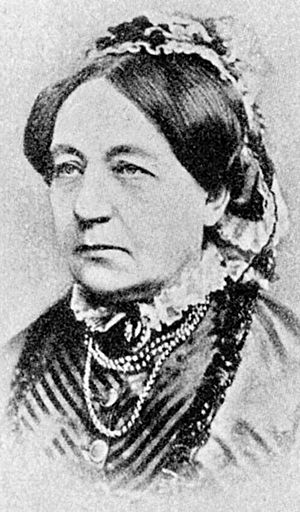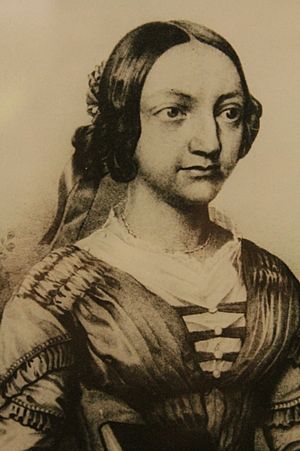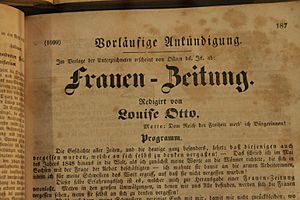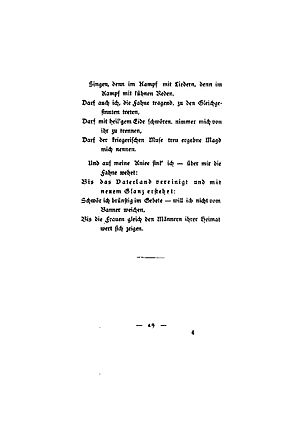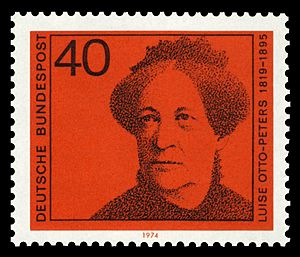Louise Otto-Peters facts for kids
Louise Otto-Peters (born March 26, 1819, in Meissen – died March 13, 1895, in Leipzig) was a very important German activist who fought for women's rights. She was a suffragist, meaning she believed women should have the right to vote. Louise was also a talented writer, creating novels, poems, essays, and even stories for operas. She wrote for several newspapers and even started her own, like Frauen-Zeitung and Neue Bahnen, specifically for women. She is most famous for starting the General German Women's Association in 1865.
Contents
Early Life and Writing Journey
Louise Otto was born in Meissen, Germany. Her father, Wilhelm Otto, was a successful lawyer. Louise was taught at home by private teachers. When she was 16, a sad time came as both her parents and an older sister passed away. After this, Louise lived with her two older sisters. To earn a living, she began writing novels, short stories, poems, and articles about politics. From 1843, she also worked as a journalist, writing about her ideas on what it meant to be a woman and how women fit into politics.
Louise became friends with Robert Blum and other people who believed in democracy. This helped her write for their newspapers, such as Der Wandelstern and Sächsische Vaterlandsblätter. By the end of 1843, Louise was a regular writer for these papers. Sometimes, she used the pen name Otto Stern.
Fighting for Women's Voices
After the democratic revolution in 1848, Louise Otto-Peters started Frauen-Zeitung (Women's Newspaper). This was the very first political newspaper for women in Germany! However, her newspaper led to a new law in Saxony that specifically stopped women from being newspaper editors. To keep publishing, her newspaper had to move from Leipzig to Gera, which was outside Saxony. It continued to be published until 1853.
Louise got engaged to August Peters in 1849. He was put in prison because he spoke out against the government. They finally married in 1858, but sadly, August Peters died in 1864 from heart disease.
In 1855, Louise started another women's magazine called Neue Bahnen (New Paths). Then, in 1865, Louise Otto-Peters, along with Minna Cauer and other women who supported women's rights, founded the Allgemeiner Deutscher Frauenverein (General German Women's Association). They also took part in the first women's conference in Leipzig. Louise was the main editor of Neue Bahnen until she passed away in 1895.
Louise Otto-Peters is buried in the Neuen Johannisfriedhof cemetery in Leipzig.
Her Impact and Importance
People who knew Louise Otto-Peters called her the "songbird of the German women's movement." This shows how much they admired her writing and her work. Her first novel about social issues was Ludwig the Waiter (1843). Another important novel was Castle and Factory (1846–1847). This book was even taken away by the authorities at first, but it helped bring attention to her work. Louise Otto-Peters often spoke out, asking for better working conditions for women who were poor.
She believed that women's unique qualities, like being caring and concerned for others, were very important. She thought these qualities were valuable not just at home but also in public life. She argued that if women had good-paying jobs, it would help not only individual women but also society as a whole.
Recognition and Works
In 1958, a film from East Germany called Nur eine Frau (Only one Woman) was made about her life.
Louise Otto-Peters wrote many different kinds of works. Some of her novels include:
- Ludwig der Kellner (1843)
- Schloß und Fabrik (Castle and Factory) (1846-1847)
- Nürnberg (1858)
She also wrote novellas (shorter novels) and short stories, like Aus der neuen Zeit (From the New Time) (1845). Her poems include Lieder eines deutschen Mädchens (Songs of a German Girl) (1848) and Mein Lebensgang (My Life's Journey) (1893).
Besides her creative writing, she wrote important essays like Das Recht der Frauen auf Erwerb (The Right of Women to Earn a Living) (1866) and Frauenleben im Deutschen Reich (Women's Life in the German Empire) (1876). She also wrote stories for operas, such as Die Nibelungen (1852).
Louise Otto-Peters was also an editor or co-editor for several journals, including Deutsche Frauenzeitung and Neue Bahnen.
See also
 In Spanish: Louise Otto-Peters para niños
In Spanish: Louise Otto-Peters para niños
 | Leon Lynch |
 | Milton P. Webster |
 | Ferdinand Smith |


